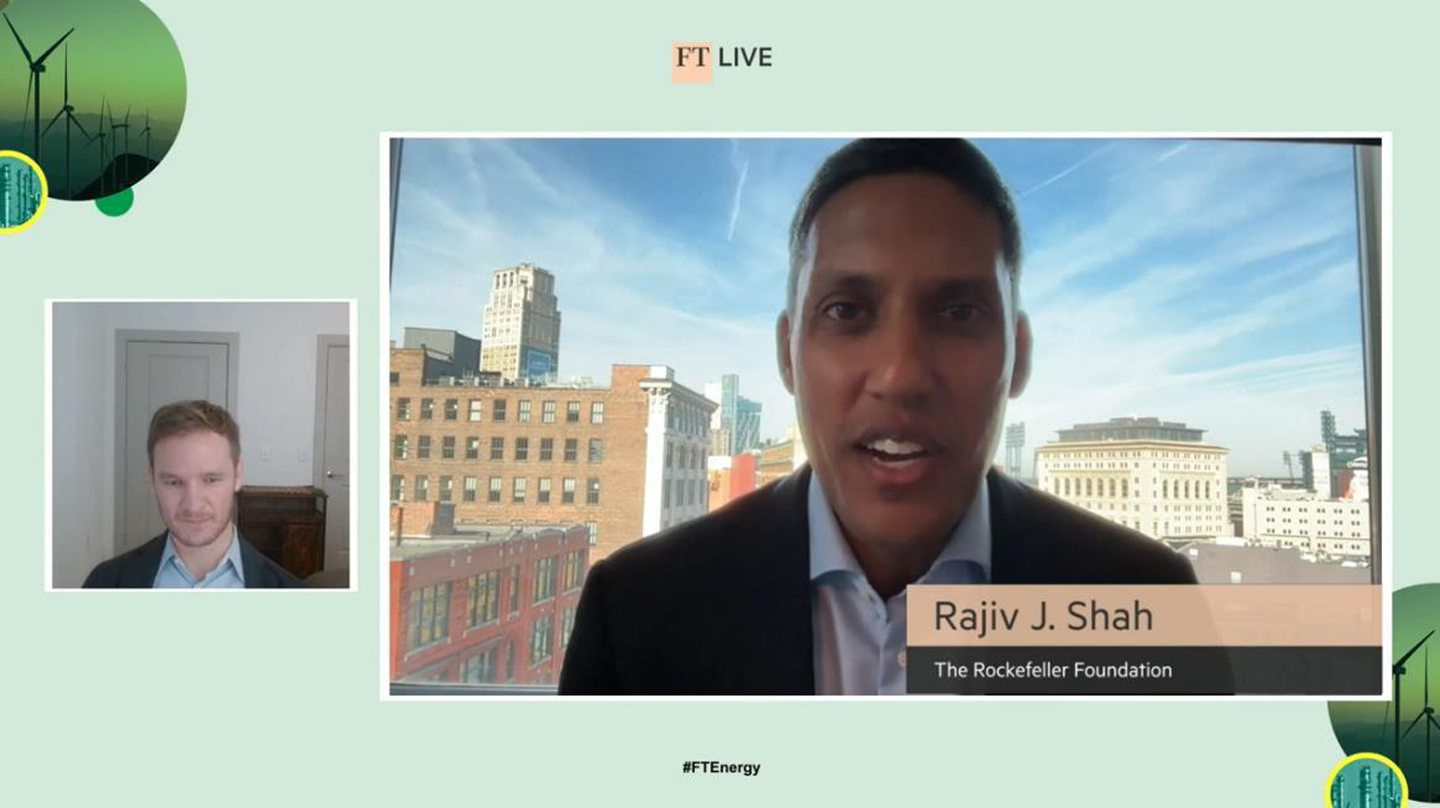The president of The Rockefeller Foundation, a multi-billion-dollar philanthropic investment house that began life investing the oil profits of John D. Rockefeller, has said the firm’s priority is an “equitable” energy transition.
Speaking at the FT Energy Transition Summit on Tuesday, Rockefeller president Rajiv J. Shah said that hydrocarbons no longer represent the cheapest form of power production.
He said energy remains the key to “improving human welfare on this planet at scale” and that the answer to building out energy infrastructure globally is through partnerships between the public and private sectors.
Shah said the investment house has already partnered with the World Bank and the International Monetary Fund as part of Mission 300 to build out renewable energy capacity in sub-Saharan Africa.
“I would say when John D. Rockefeller senior founded this institution more than 100 years ago, the premise was very simple,” Shah said. “He was looking for areas where science and innovation could be harnessed over the long term to lift up as many people around this planet as possible.
“That simple idea, making big bets based on how science innovation can help lift people up, our map brought us to climate vulnerability and the need to invest massively in an equitable, and just, and pervasive energy transition.”
The firm that began life as a family office has “the courage to imagine a world that comes together, public and private, to ensure everyone has access to low-cost reliable energy and that low-cost reliable energy is absolutely as clean as possible to protect our children’s futures,” Shah said.
The Rockefeller Foundation’s founder J. D. Rockefeller made his money by setting up Standard Oil Company in the United States, which grew to become one of the country’s biggest corporate trusts, making him one of the wealthiest philanthropists in the country’s history.
Although investment in clean energy appears to be a departure from a sector in which the foundation is rooted, Shah explained that doing so aligns with the family office’s early fundamental focus on harnessing science to transform the accessibility of energy and health-care.
“We know that Earth is warming,” he said. “We know we are already past one and a half degrees or two, maybe just higher than that, and at those levels of global warming, we’re going to see vast reductions in… food availability in communities that are most vulnerable.
“We already see massive consequences in terms of erratic weather and what that’s causing from migration, to storms and damage. So, when we thought about, ‘How could we help billions of people?’ The answer to us was to invest in a transition that’s just and equitable, starting with large-scale investments in the energy transition.”
Hydrocarbons not “cheaper”
The Rockefeller Foundation’s president Shah said that it is “not true” that there is cheaper and easier to access hydrocarbons, debunking the assumption that building out coal-based infrastructure in emerging economies is the cheapest way to provide power.
Where the grid system is feeding about 20% of the total economy “you’re leaving hundreds of millions of people behind” by only building out more fossil fuel systems, he said.
He explained that it is particularly untrue that diesel power production and other oil and hydrocarbons are cheaper than renewables in markets such as Nigeria, the Philippines and Vietnam.
“In fact, the way to expand those grids is now often much more efficient to build these interconnected mini-grids that are powered by more resilient and more distributed sources of power,” said Shah.
“Whether that’s solar or micro-hydro, or wind, or what have you and with the right battery technology, if they can get access to it, then you can start to meet price points that are highly effective all-in compared to just building out transmission and distribution and then adding more hydrocarbons to a grid.”
“Dominant source”
Marième Travaly, who manages regional infrastructure investment for the World Bank’s International Finance Corporation (IFC), said at the summit on Tuesday that emerging markets can “leapfrog” the West in the energy transition.
She said, while speaking on a panel to discuss how to deliver the capital needed for the energy transition, that the future dominant source of energy is already within the world’s grasp.
Travaly said “seeing renewables as the dominant energy source” will be one of the biggest global shifts in energy infrastructure by 2030.
“By 2030, definitely renewable energy, particularly solar, and wind, is projected to account for over 42% of global electricity generation,” she said.
“So renewables will surpass coal as the larger source of electricity even by 2025, driven by aggressive investment and technology advancement.”
Travaly outlined three ways in which global energy infrastructure will shift by the end of this decade, forecasting a decline in fossil fuels without a total phase-out by 2030, which she described can only happen by building out energy storage and alternative renewable energy capacity.
Whereas the UK phased out coal power production this summer, Travaly expects that investment in renewable energy, particularly in emerging markets, will increase exponentially in the next decade.
The International Energy Agency estimates that global energy investment will reach a record $3 trillion (£2.3tn) in 2024, with $2tn being invested in clean energy.
Travaly said the IFC believes some heavy industries such as aviation will “still rely on fossil fuels” though at a reduced rate, but that there would be a focus on assets for cash with minimal reinvestment as companies and investors shift towards alternatives.
“With support from institutions like ours, these markets will increasingly attract investment in… renewable energy projects, and they are going to leapfrog traditional fossil fuel energy,” she said.
“However, I want to always emphasise that to meet the climate targets…concessional financing of about $80 to $100 billion will be needed to de-risk the investment.”
Source link
#Rockefeller #targets #equitable #pervasive #energy #transition
